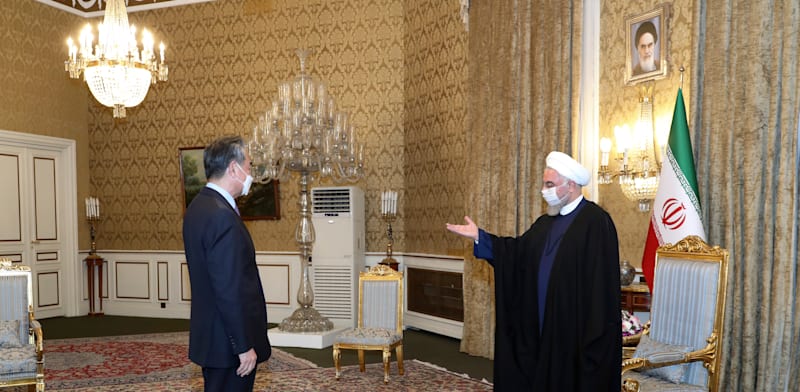
Iran and China today (Saturday) signed a 25-year cooperation agreement, during a visit by the Chinese Foreign Minister to Tehran. The agreement includes Chinese investments in Iran’s energy and infrastructure sectors. Both countries are subject to US sanctions, and the rapprochement between them is intended to dilute their influence. Beijing continues to buy oil from Tehran despite US sanctions imposed on it during the tenure of former President Donald Trump.
“The document is a complete roadmap, with political and economic clauses, covering cooperation in trade, economy and transportation, with a special focus on the private sector on both sides,” Iranian Foreign Ministry spokesman told official television yesterday, beginning with the Chinese Foreign Minister’s visit. Wong Yi.
Deepening cooperation between China and Iran may hamper efforts by the United States and European countries to salvage the nuclear deal. Although China has signed it, Iran’s willingness to compromise in negotiations may be less if it succeeds in circumventing sanctions.
In addition, Iran is in a kind of waiting period until the June presidential election, in which it will elect President Hassan Rouhani’s successor after two candidacies. The next president may come from the ranks of the conservative camp, which will make it even more difficult for contacts with the West.
The Islamic Republic is demanding that the Biden administration remove all sanctions imposed on it since Trump withdrew from the nuclear deal, but Washington, at least explicitly, has gifted it in stopping Tehran’s violations.
Tonight, an American source has taken a more pragmatic stance, stressing that the administration does not insist that Iran be the one to take the first step. According to him, the question is on what reciprocal steps the states will agree to restart the discourse, it does not matter who will do them first.
On Thursday, China’s Ministry of Commerce said Beijing would work to preserve the nuclear deal and protect the “legitimate interests” in its relations with Tehran. This was in response to a Reuters report that Iran had indirectly shipped a record amount of oil to China in recent months. The oil was marked as a supply from other countries, and official customs documents in China do not specify imports of Iranian oil in the first two months of the year.
China is Iran’s largest trading partner, and in 2016, following the signing of the nuclear deal and the lifting of sanctions, it agreed to increase bilateral trade with Iran to more than 600 billion within a decade.
China’s relations with the United States have also deteriorated in recent years, and more so since the outbreak of the corona plague in late 2019. In his last term, Trump changed his positive attitude toward China’s leadership, imposing sanctions on Beijing over the partition of Hong Kong autonomy and oppression of the Muslim Uighur minority. Which he defined genocide.
Last week, the first direct talks between representatives of the Biden administration and their Chinese counterparts took place, and they were characterized by a public confrontation in front of the cameras, with the senior diplomats of the two powers exchanging verbal blows. Despite the tensions, Chinese President Xi Jinping was invited to attend a virtual conference on the climate crisis that Biden is convening next month.